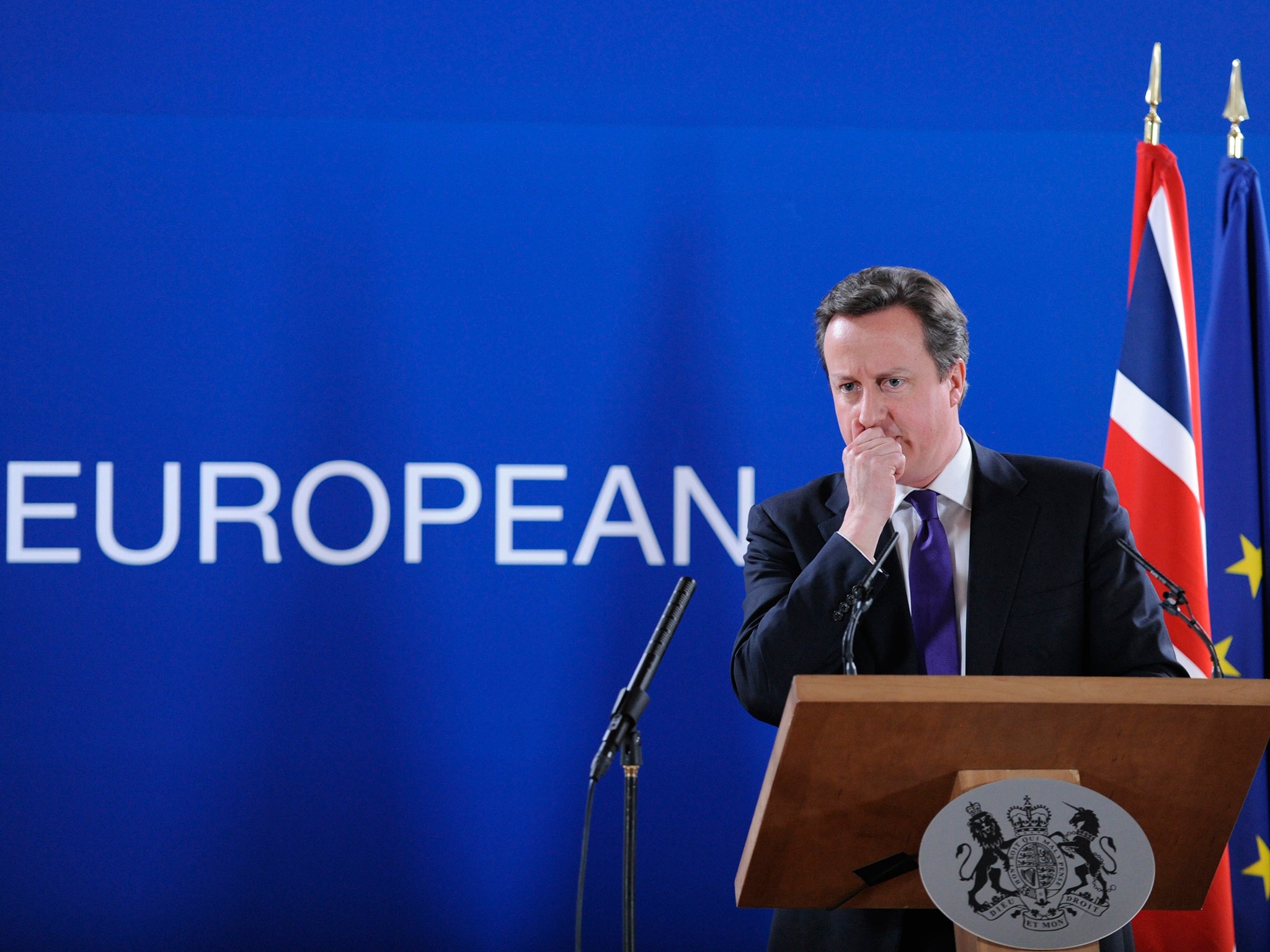EU referendum: David Cameron U-turns over question - voters will now be asked whether they want to 'remain in' or 'leave' the EU
Change in question came after the Electoral Commission found that the 'Yes/No' format was too biased

Your support helps us to tell the story
From reproductive rights to climate change to Big Tech, The Independent is on the ground when the story is developing. Whether it's investigating the financials of Elon Musk's pro-Trump PAC or producing our latest documentary, 'The A Word', which shines a light on the American women fighting for reproductive rights, we know how important it is to parse out the facts from the messaging.
At such a critical moment in US history, we need reporters on the ground. Your donation allows us to keep sending journalists to speak to both sides of the story.
The Independent is trusted by Americans across the entire political spectrum. And unlike many other quality news outlets, we choose not to lock Americans out of our reporting and analysis with paywalls. We believe quality journalism should be available to everyone, paid for by those who can afford it.
Your support makes all the difference.David Cameron has U-turned on the EU referendum question, scrapping plans to ask voters a 'Yes/No' question that the elections watchdog warned was too biased.
In a boost for those campaigning to leave the EU, voters will now be asked whether they want the UK to remain in the European Union or leave it, replacing the 'Yes' or 'No' format previously proposed.
The Prime Minister's spokeswoman confirmed the Government had decided to accept the recommendation from the Electoral Commission to amend the question so it no longer involve 'Yes' and 'No' answers.
The Government will now amend the question to the Commission's recommendation: "Should the United Kingdom remain a member of the European Union or leave the European Union?"

The responses would be "Remain a member of the European Union" or "Leave the European Union" if the amended question is accepted by MPs when they return on September 7.
The planned change in the wording was welcomed by campaigners for a British exit, or “Brexit”, who believe it gives them a better chance of winning over the uncommitted. It is thought that people who are asked about an issue on which they have no strong feelings either way are more likely to answer “yes” because they do not like to be negative.
The Commission recommended the change after its research and consultation found that the current question planned - "should the United Kingdom remain a member of the European Union" - was not balanced and favoured the 'Yes' camp.
The referendum will be held before the end of 2017 but it could be staged as early as next year if the Prime Minister succeeds in his mission to secure reforms from the 28-state bloc by the end of 2015.
Eurosceptics welcomed the decision, saying it gave voters a much clearer and balanced choice.
Explaining the Electoral Commission's recommendation to amend the question, its chair Jenny Watson said: "Any referendum question must be as clear as possible so that voters understand the important choice they are being asked to make.
"We have tested the proposed question with voters and received views from potential campaigners, academics and plain language experts.
"Whilst voters understood the question in the Bill some campaigners and members of the public feel the wording is not balanced and there was a perception of bias.
"The alternative question we have recommended addresses this. It is now for Parliament to discuss our advice and decide which question wording should be used."
This morning Nigel Farage said he was willing to work with "absolutely anyone" to ensure voters opted to leave the EU.
Speaking as Ukip prepared to launch its own 'Brexit' campaign, he ruled out heading the official 'Out' campaign, which will be granted higher spending limits, television broadcasts and will be given a grant.
He told Radio 4's Today programme: "Let’s be clear, I’m not refusing to work with anybody, in fact the opposite, I’ll work with absolutely anyone for us to get a no vote in this referendum," he said.
"All I’m saying is I’m not choosing one side or another, I will work with whichever of them gets the nomination although I have to say privately before we get to that point I hope there is a coming together of the two of them because both of them have got skills.
"There has to be an umbrella group and whoever gets it we’ll work with but I think the unique role that Ukip can play within this is that we’ve got 50,000 members, hundreds of branches across the country and we can do the ground campaign."
It is still not known whether Boris Johnson will join a Brexit campaign. Asked on LBC radio whether there were any circumstances under which he might campaign to leave the EU, London’s Mayor replied: “Yes of course.” But he hedged his bets by declaring that he had “strong confidence” that Mr Cameron could negotiate a satisfactory deal with other EU states that would make continued membership acceptable.
The power of yes
Experts say that there is a subtle advantage to being on the “yes” side. “It’s the Bob the Builder philosophy,” Matt Qvortrup, an expert on referendums from Coventry University, told the BBC. “It is the ‘Yes we can’ mood that was used by Obama. It is an attempt to be the positive campaign because nobody likes to be seen as negative.”
But there is also ample evidence that when faced with a complicated choice, people are more likely to be swayed by a fear of losing what they already have rather than the hope of any gain – which suggests that inviting people to vote to “remain” may be easier than getting them to vote to “leave”.
Join our commenting forum
Join thought-provoking conversations, follow other Independent readers and see their replies
Comments